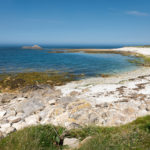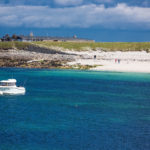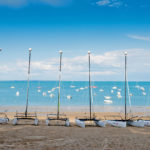Table of Contents
British holidaymakers are discovering what savvy travelers have known for years – Brittany’s beaches offer everything Cornwall does, but with better weather and fewer crowds. The French cousin of Britain’s southwestern peninsula delivers the same Celtic charm but with an unmistakable French twist.
The Channel Hop That Changes Everything
Making the short crossing from Plymouth to Roscoff opens up a world of possibilities for British beach lovers. The ferry journey takes less time than driving from London to Cornwall, and you’ll find yourself in a region that feels reassuringly familiar yet excitingly foreign.
Same Same, But Different
Like Cornwall, Brittany boasts dramatic cliff tops and hidden coves that seem to have been lifted straight from a romance novel. But here, you’ll find pristine sandy stretches without the summer crowds that have become synonymous with Cornish hotspots.
The Weather Factor
While Cornwall and Brittany share the same latitude, Brittany enjoys a more favorable microclimate. The region benefits from longer sunshine hours and warmer sea temperatures, making those beach days significantly more enjoyable.
Value for Money
Despite Brexit, British visitors still find their pounds stretch further in Brittany. Beachfront accommodations often cost less than their Cornish equivalents, and the quality of local amenities tends to be higher.
The Food Scene
Both regions are famous for their seafood, but Brittany edges ahead with its culinary offerings. Fresh oysters, moules-frites, and galettes cost a fraction of similar meals in Cornwall, and the quality is consistently outstanding.
Beach Infrastructure
Brittany’s beaches benefit from excellent facilities and infrastructure. Well-maintained toilets, showers, and changing rooms are standard, even at smaller beaches – a level of service that puts many UK beaches to shame.
The Space Factor
While Cornwall’s popular beaches can feel like sardine tins in high season, Brittany’s coastline offers enough space for everyone. Even in peak season, you can find stretches of sand where your only company might be a few seabirds.
Water Quality
Both regions boast excellent water quality, but Brittany’s beaches consistently receive top marks from EU testers. The clear, blue waters rival any Mediterranean destination, without the salt content that can sting your eyes.
Family-Friendly Features
Brittany’s beaches excel at catering to families with young children. Many beaches feature supervised kids’ clubs, something rarely found on British shores, and the gently sloping beaches create natural paddling pools at low tide.
The Culture Bonus
Visiting Brittany’s beaches comes with an extra dose of culture. Children can practice their French, while parents can immerse themselves in a region that shares Cornwall’s Celtic heritage but with its own distinct flavor.
Accessibility Matters
Getting to Brittany can be easier than reaching Cornwall during peak season. Multiple ferry routes and flights mean you can avoid the notorious A30 traffic jams that plague Cornwall-bound holidaymakers.
The Activity Scene
Like Cornwall, Brittany offers excellent surfing, but with more consistent waves and warmer water temperatures. The region also provides better infrastructure for water sports, with equipment rental and lessons widely available.
Accommodation Options
From campsites with sea views to luxury hotels, Brittany matches Cornwall for accommodation choices but often at better prices. The French camping experience, in particular, tends to be more comfortable than its British counterpart.
Evening Entertainment
While Cornish towns quiet down early, Brittany’s coastal communities come alive at night. Evening markets, outdoor concerts, and festive gatherings create a Mediterranean atmosphere that extends the day’s pleasures.
The Walking Routes
Both regions offer spectacular coastal paths, but Brittany’s GR34 trail is better maintained and marked. The path connects countless hidden beaches and coves that remain undiscovered by most tourists.
Historical Interest
Both regions boast impressive historical sites, but Brittany’s megalithic monuments and medieval towns provide a different perspective. Many of these sites are conveniently located near beautiful beaches, making for perfect day trips.
Wildlife Watching
Like Cornwall, Brittany offers excellent opportunities for wildlife spotting. Dolphins, seals, and various seabirds are regular visitors to its shores, often visible from the beach itself.
The quiet nature of these beaches means increased chances of wildlife encounters. Seals often rest on rocks near these secluded spots, while various seabirds nest in surrounding cliffs undisturbed by human activity.
Dawn and dusk bring opportunities to observe coastal wildlife in their natural habitat. The absence of crowds means animals behave naturally, offering unique opportunities for nature photography or quiet observation.
The Coffee Culture
While Cornwall has embraced café culture, Brittany’s beachside cafés offer a more relaxed, continental experience. Long lunches and leisurely coffee breaks are part of the daily rhythm.
Local Attitudes
The Bretons, like the Cornish, take pride in their distinct cultural identity. However, visitors often find the French hosts more relaxed about sharing their beaches and more welcoming to tourists.
Transportation Options
Unlike many Cornish beaches that require a car to access, Brittany’s coastal areas are well-served by public transport. Many beaches are accessible by local buses or trains, making car-free holidays a realistic option.
Seasonal Changes
Each season brings different qualities to these peaceful retreats. Spring offers wildflowers and migrating birds, while winter creates dramatic seascapes perfect for contemplative walks.
Summer mornings provide perfect swimming conditions before any other visitors arrive. The shoulder seasons offer particularly peaceful experiences, with perfect temperatures and minimal disturbance.
Weather Considerations
These exposed locations can experience rapid weather changes, requiring visitors to stay alert and prepared. The remote nature of these spots means having good weather awareness and knowing when conditions might change.
Local weather patterns often differ from regional forecasts, making it worth checking multiple sources before visiting. Understanding local weather signs helps in planning visits during the most peaceful conditions.
Future Preservation
Maintaining the secluded nature of these beaches requires ongoing effort from both locals and visitors. Supporting local conservation initiatives helps ensure these peaceful spots remain protected for future generations.
The challenge lies in balancing access with preservation, ensuring these beaches remain peaceful retreats without becoming completely inaccessible. Responsible visitors play a crucial role in maintaining this delicate balance.
A Final Thought
For British travelers seeking the perfect beach holiday, Brittany offers a compelling alternative to Cornwall. With better value, more space, and a dash of French flair, it’s no wonder more UK families are choosing to cross the Channel for their coastal getaway.

I’ve always been captivated by Brittany’s unique charm, and I started this site to share my favourite spots and tips with fellow travellers. From exploring hidden beaches to experiencing local culture, I aim to provide practical advice and fresh perspectives on everything this destination has to offer.




